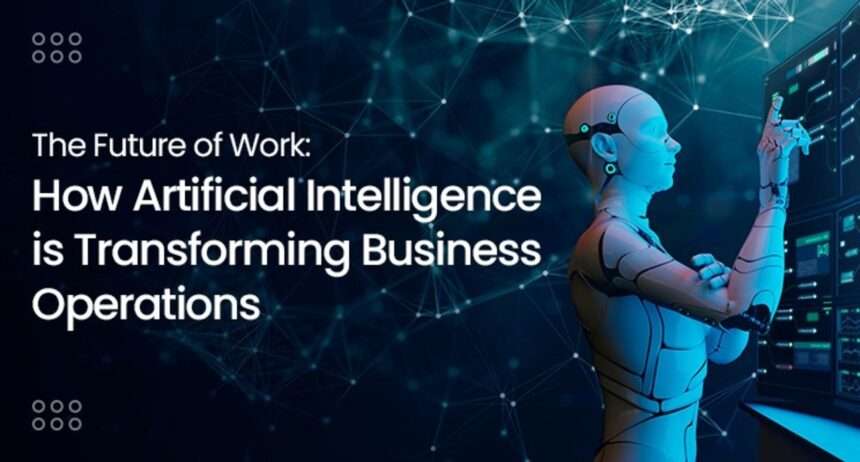The Rise of the Machines? No, the Rise of Opportunity! How AI is Revolutionizing Businesses
Imagine a world where your store anticipates what you need before you do, where customer service is available 24/7 and remembers your preferences, and where factories run like clockwork, predicting and preventing problems. This isn’t science fiction; this is the future powered by Artificial Intelligence (AI).
AI is no longer just a concept in movies. It’s rapidly transforming our everyday lives, and businesses are at the forefront of this exciting revolution. But what exactly is AI, and how is it impacting the way companies operate?
Simply put, AI refers to machines that can mimic human intelligence. They can analyze massive amounts of datas, identify patterns, and even make predictions. This allows businesses to discover numerous hints and autonomously perform tasks that were previously exclusive to humans.
Key Components Of AI
Machine learning (ML) is a crucial part of artificial intelligence (AI). It enables computers to learn from data and make decisions without explicit instructions. This technology transforms businesses in various ways. For example, it uses predictive analytics to forecast sales, which helps in inventory management and marketing. ML also enhances customer understanding by analyzing behavior patterns, enabling companies to tailor their products and marketing efforts more effectively. Additionally, ML improves operational efficiency by optimizing logistics and reducing costs, which aids in better supply chain management.
Natural Language Processing (NLP) allows computers to understand and interact using human language, greatly impacting customer service and market analysis. NLP-driven chatbots and virtual assistants can handle routine customer inquiries, freeing human agents for more complex tasks and so on. These tools also analyze social media to provide real-time consumer sentiment insights, helping companies adjust their strategies quickly. AI also plays a significant role in managing the vast amounts of data generated today. It helps assisting in real-time data processing and enhancing decision-making through detailed analytics. As companies continue to leverage AI, the potential for enhanced growth and efficiency is for sure. This shapes and defines the future of business.
AI’s Deep Impact On Today’s Businesses
Artificial Intelligence (AI) is not just revolutionizing. It’s redefining how businesses operate across the globe. As AI technology advances, it impacts various key areas, significantly altering the business landscape.
Businesses today are embracing AI to gain a competitive edge. Here’s how:
Enhanced Automation
Automation, is one of the most significant transformations in the business sector. It extends beyond simple repetitive tasks to more complex operations. For example, in manufacturing, AI-driven robots can adjust operations in real-time based on sensory input. This level of automation increases production efficiency, reduces errors, and lowers operational costs. Hence, this allows human workers to focus on more strategic activities.
Personalized Experiences
AI enables businesses to offer personalized experiences to their customers. This includes analyzing vast amounts of data to tailor products, services, and interactions to individual preferences. This personalization is already an evident in marketing. Here, AI algorithms predict customer behavior and tailor messages at an individual level to increase engagement and conversion rates. Similarly, another example would be an e-commerce. AI recommendations influence shopping experiences by suggesting products uniquely suited to each shopper’s taste and purchase history.
Data-Driven Decision Making
With AI, companies can leverage big data to make more informed and timely decisions. AI excels in uncovering patterns and insights from large datasets quickly. This can significantly enhance strategic planning and risk management. For instance, financial institutions use AI for real-time fraud detection and credit risk assessment. This vastly helps improving security and reducing losses.
Improved Customer Service
AI significantly enhances customers service by providing 24/7 support through intelligent chatbots and virtual assistants. These AI systems understand and process natural language, making interactions smoother and more human-like. They handle routine inquiries efficiently, ensuring that human agents are available for more complex issues. Thus, improving overall customer satisfaction and loyalty.
Innovation and Efficiency
AI drives innovation by enabling new products and services while optimizing the existing processes. It improves efficiency. In the healthcare industry, AI tools help in diagnosing diseases with higher accuracy and speed than traditional methods. AI also aids in drug discovery by predicting how different chemicals will react together, speeding up the research process and reducing costs.
Scalability
AI technologies help businesses scale operations more effectively. They allow companies to handle increasing amounts of work without a corresponding increase in overhead or resources. This is crucial for startups and growing businesses that need to expand quickly to capitalize on market opportunities without compromising on service quality or operational efficiency.
Risk Management
AI improves risk management by predicting potential failures and system breaches before they occur. By analyzing historical data and identifying trends, AI can forecast risks with a high degree of accuracy. For instance, financial institutions uses AI to assess the risk profiles of potential clients based on patterns that might not be evident to human analysts.
Sustainability
AI contributes to environmental sustainability by optimizing resource use and reducing waste. In the energy sector, AI algorithms forecast energy demand and adjust supply, significantly enhancing energy efficiency. Smart grids, powered by AI, not only distribute electricity efficiently but also integrate renewable energy sources into the power grid smoothly.
Impact of AI on Business Models
AI alters traditional business models by enabling more personalized services, efficient operations, and strategic decision-making. In retail, for example, AI predicts buying trends, personalizes shopping experiences, and manages inventory with high precision. Manufacturing industries use AI for predictive maintenance, minimizing downtime by predicting equipment failures before they happen. These capabilities allow businesses to shift from a one-size-fits-all model to a more tailored approach, meeting customer needs more effectively and gaining a competitive edge.
AI will tackle increasingly intricate tasks, potentially revolutionizing various sectors. AI platforms will grow more subtle, capable of dynamic learning and adaptation. Humans and AI will work closely together, with AI making tasks smoother and analyzing data, while humans focus on creative and strategic thinking.
Common Uses of AI In Businesses
Cyber security
Most organizations recognize the need for external assistance to fully leverage AI for business benefits. Imagine having a watchful guard who constantly scans your business for suspicious activity. This guard never sleeps, can analyze mountains of information in seconds, and even remembers past threats to predict future attacks. That’s the power of Artificial Intelligence (AI) in cybersecurity.
Customer Relationship Management
Customer relationships are the golden key to any successful business. But in today’s fast-paced world, keeping customers happy and engaged can be a challenge. That’s where Artificial Intelligence (AI) steps in, offering a powerful toolbox to transform how you connect with your customers.
AI can analyze vast amounts of customer data, from purchase history to social media interactions, to gain a deeper understanding of your customers’ needs and preferences.
But there are some things to be carefull about as well. Integrating AI into your CRM requires careful planning and consideration. However, the potential benefits are undeniable. By leveraging AI’s power, you can build stronger customer relationships, boost loyalty, and ultimately drive business growth.
Personal Assistants
AI personal assistants, like Siri or Alexa, make life easier by following voice commands. They can schedule meetings, set reminders, or even order groceries—all without you needing to type a single word.
AI is transforming how businesses operate, making processes smarter and faster. Whether it’s learning from data, protecting against threats, or improving customer interactions, AI’s role is crucial and growing.
The Impact of AI on Employment: A Dynamic Evolution
AI’s influence on jobs is a complex issue. Here’s what we know:
Job Transtition: Certain repeitive roles may undergo automation, requiring workers adapt and develop new skills.
Job Expansion: Opportunities will emerge in AI development, management, and maintenance of AI systems.
The Job Market After the AI Shift
Some experts vehemently deny that AI will automate so many jobs that millions of people find themselves unemployed, while other experts see it as a pressing problem.
Workers will have to pick up new abilities like critical thinking, problem-solving, and data analysis.Companies will treasure talents that AI can’t mimic, such as creativity, understanding emotions, and leadership.
The Rise in Specific Skills Set
In the upcoming job market, we might witness: Demand for data scientists: Skilled individuals will be sought after to create, handle, and interpret complex AI setups. Growing demand for AI experts: Industries will need professionals to look after and smoothly integrate AI technologies.
The Takeaway
AI in Action: From Science Fiction to Business Reality.
Remember how robots took over the world in movies? Well, forget it. AI is here, but it helps businesses thrive rather than replacing us! Today, businesses are using AI as a secret weapon to run more smoothly, better understand their customers, and keep them satisfied.
Here’s how: AI takes care of the boring stuffs: Repetitive tasks such as data entry and scheduling are automated, allowing employees to focus on more important and interesting work.
AI predicts the future (almost). By analyzing massive amounts of data, AI can predict what will happen next. This helps businesses understand what their customers want and how the market will change. This allows them to stay ahead of the competition.
AI can makes customers smile. Consider a helpful robot that can answer your questions and recommend products you’ll enjoy. This is the power of AI in customer service! It improves the overall experience for everyone.
In a nutshell, AI functions similarly to a super-powered business assistant. It enables them to work more efficiently. It better understand their customers, and ultimately succeed in today’s fast-paced world.









